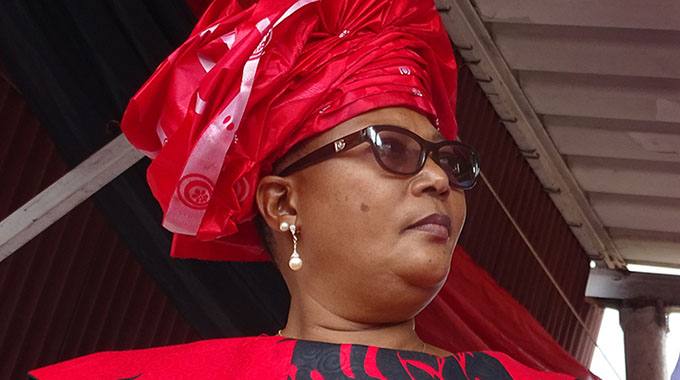Sanctions not in the national interest

Takunda Maodza Manicaland Bureau Chief
ARE sanctions on Zimbabwe in the national interest? Some Zimbabweans still think the sanctions discourse is debatable.
They deny the existence of the embargo and summarily blame the collapse of the economy on the Government.
They point to corruption and maladministration as exclusively responsible for the economic challenges that Zimbabwe is facing today.
But as sanctions continue to bite the economy, the pain and suffering is fast disillusioning many, even those in the opposition.
Among the newly enlightened are former MDC bigwigs and trade unionists, Dr Thokozani Khupe and Ms Lucia Matibenga.
Dr Khupe is the MDC-T president, while Ms Matibenga was formerly the MDC Women Assembly chair during the days of the late Mr Morgan Tsvangirai.
Ms Matibenga now leads the People’s Rainbow Coalition. The pair was among opposition leaders who attended a two-day workshop in Nyanga organised by the Political Actors Dialogue (POLAD) to strategise on the removal of sanctions.
Dr Khupe and Ms Matibenga did not mince their words when it came to the effects of the economic embargo on the economy and ordinary Zimbabweans, pointing to need to put national interest first.
National interest, they said, is all about the survival, protection of the physical, political and cultural identity of a nation against encroachment by other nations.
Dr Khupe believes lack of advocacy on the negative impact of sanctions on ordinary Zimbabweans might have contributed to the continued existence of the embargo.
She also blames the continued existence of sanctions on selfish politicians who “sleep, eat, and think power”.
Dr Khupe said national interest should come first above anything else.
“I think as politicians, it is high time we stand up and say let us put our country first.
“Zimbabwe must come first before anything else. Let us move away from politics of power and positions and try politics of a better life for every Zimbabwean. The major focus of many political parties is power and positions,” she told The Herald on the sidelines of the workshop.
Dr Khupe openly admitted that sanctions had ruined the economy, something she could never do when she was still deputising Mr Tsvangirai.
Speaking against sanctions was taboo in opposition politics, but it now seems Zimbabweans across the political divide are feeling the heat of the sanctions and want them urgently removed.
“People do not know that in 2000 or way back, many flights used to come to Zimbabwe, but they have stopped.
“People do not know that we used to export horticulture produce to many countries, but all that has stopped. Where do you expect to get income from? As we speak right now, we cannot get any lines of credit.
“When you look at 2001 when sanctions were imposed, people had jobs, industry was operating, but look at where we are now.
“Industries have closed, people do not have jobs. Is this what we want as a country? These are the effects of sanctions,” said Dr Khupe.
She rallied Zimbabweans to speak with one voice on the matter.
“It is high time we speak with one voice because this is about life and death. It is affecting ordinary Zimbabweans.
“Is it in the national interest for Zimbabweans to be jobless? Is it in the national interest for global capital to shun Zimbabwe? It is in the national interest for all Zimbabweans advocate for the removal of sanctions.”
Ms Matibenga also shared her sentiments on the lifting of the embargo.
“I did not realise the impact of sanctions until after that presentation,” she told a colleague.
Her remarks followed a presentation by the Ministry of Foreign Affairs and International Trade to the POLAD on the impact of sanctions on the economy and ordinary people.
“We have decided that we are joining the advocacy for campaigning against sanctions and the removal of sanctions. Once a person embarks on an advocacy, there is need to be clear about issues for which you are advocating for,” she said.
“This workshop seeks to capacitate us as political actors with the issues and facts about these sanctions so that when we do the advocacy campaign, we are clear, we are factual and we are able to change the narrative and have the people affected talking about them.
“It is clearly in the national interest for opposition parties that have not yet joined the war against sanctions to do so as we have no other home outside Zimbabwe.
“No matter our political differences, putting the health of the nation first becomes a national call. While some may continue to deny the existence of sanctions on Zimbabwe, it is important to note that since the embargo was placed, access to credit lines has been blocked, leading to the drying up of traditional sources of external finance.”
The negative perception that has come with sanctions has impacted negatively on the entire spectrum of the economy, most particularly foreign direct investment.
Of importance to note here is the fact that prior to the new administration assuming office, the country’s investment climate was soiled by such laws as the Indigenisation and Economic Empowerment Act, which have since been scrapped off the statutes.
On agriculture, key institutions that fund the sector were placed under sanctions.
One such institution is the Agribank, which was put under sanctions in February 2016 and cannot effectively finance agricultural activities due to lack of lines of credit.
The agriculture sector has potential to create thousands of jobs, and it is in the national interest to have our youths employed.
Further, under the Convention on Beef and Veal Protocol, Zimbabwe had a preferential tariff quota allowing her to export 9 100 tonnes of beef to the EU annually.
Under the Sugar Protocol, Zimbabwe’s preferential tariff quota stood at 30 225 tonnes annually and could increase to 25 000 tonnes under the variable Special Preference, but all the quotas were lost owing to sanctions.
The mining sector was not spared. Two minerals marketing companies were slapped with sanctions in 2008 and 2012. US and EU citizens and entities were prohibited from doing business or providing financial and technical assistance to State entities.
Potential buyers of Zimbabwean minerals risked losing the minerals or proceeds.
Other sectors of the economy are also reeling under the effects of sanctions from health, education, energy and transport.
It is in the national interest to revitalise our economy for the benefit of every Zimbabwean.
“Everybody can see the impact of sanctions. We cannot deny things that are self-evident. It is now time to make sure that everybody knows the truth and make sure we highlight the impact of sanctions on ordinary people’s lives,” remarked Coalition for Democrats leader Mr Trust Chikohora, in an interview with The Herald on Tuesday.









Comments